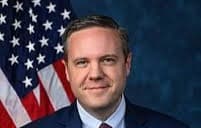U.S. Rep. Hurd talks ag, energy, more in Town Hall
“I want to listen first and then find practical solutions for the people I represent.”
Those were the opening remarks from U.S. Rep. Jeff Hurd, R-Grand Junction, during a telephone town hall meeting Sept. 17, 2025, with 21,000 3rd District constituents attending.
The congressman emphasized his focus on strengthening Medicare and Social Security, addressing the cost of living, improving agriculture, education and energy dominance. After his introduction, he opened the floor to questions from constituents, who represented a range of political perspectives.
The town hall covered a broad spectrum of issues, including local concerns specific to the Western Slope and broader national political topics. Regional issues discussed included the Gunnison Outdoor Resources Protection (GORP) Act, public lands, tourism, water rights and the impacts of the “Big Beautiful Bill” on the Western Slope. On the national front, questions ranged from redistricting and gun rights to concerns about media bias and taxpayer waste.
One of the first questions came from Vanessa in La Plata County, who asked why Rep. Hurd co-sponsored the GORP Act alongside Colorado’s Democratic Sens. Michael Bennett and John Hickenlooper. Hurd explained that local county commissioners and organizations – including the Gunnison Valley Stockgrowers – had requested his support.
“I made a commitment to represent the people in my district,” he said. The sentiment echoes a key point Rep. Hurd emphasized during his 2024 campaign: locals should have the loudest voices on public lands issues.
Matt from Grand Junction expressed his support for Hurd’s opposition to a proposed mass selloff of public lands by Utah Sen. Mike Lee. Hurd clarified his stance, “I’m opposed to massive public land sales, but I’m not opposed to small, specific sales. For example, the Bureau of Land Management (BLM) conveyed a small parcel of land to Mesa County through the Convey Act, and that was a win-win.”
Hurd stressed the need for “multiple-use land management” to balance competing interests, such as tourism, grazing, logging, recreation, mining and oil and gas drilling.
Regarding the “Big Beautiful Bill” and its impacts on rural healthcare, Hurd noted that much of the noise around the bill stems from misunderstandings. “For middle-income seniors, Social Security will remain untaxed,” he explained, adding that a significant portion of the bill addresses healthcare spending. “Congress is working on pragmatic ways to bring down healthcare costs.”
Kathy from Clifton raised concerns about rising healthcare costs and potential cuts to Medicaid. Hurd acknowledged these challenges, particularly the rising costs in the individual insurance market, but stressed the need to lower healthcare costs overall.
“We must preserve Medicaid for those who need it most — the elderly, the disabled, single parents,” Hurd said. He also emphasized that able-bodied individuals should aim to move toward employment, noting that they could retain Medicaid benefits by working, volunteering or attending school for at least 20 hours per week.
One of the more emotionally charged moments of the town hall came when Fran from Pueblo asked why Hurd voted against censuring U.S. Rep. Ilhan Omar, D-Minnesota. Her voice shook as she asked the question.
“Ilhan Omar made reprehensible comments about Charlie Kirk and his supporters. I condemn her words completely. However, I voted against the censure because it would have stripped her of committee assignments and silenced her for exercising her First Amendment right to speech. The right response to reprehensible speech isn’t to silence it, but to allow more speech — that’s what Charlie Kirk believed, and I agree.”
Andrea from Grand Junction asked about efforts to increase graduation rates at Colorado Mesa University. Hurd highlighted aspects of the “Big Beautiful Bill” that aim to expand access to Pell Grants for both four-year degrees and vocational schools. He also pointed to increased funding for trade apprenticeship programs in response to growing infrastructure demands in Colorado.
On water rights, Hurd reaffirmed his commitment to protecting the Western Slope’s water resources.
“I’m fighting for $40 million to protect those West Slope water rights from attempts to grab them,” he said. “That water needs to stay on the Western Slope. I’d rather grow crops on the Western Slope than houses in Denver.”
Cody from Montezuma County asked about Hurd’s stance on introducing legislation for the Dolores Canyon National Conservation Area. While Hurd did not commit to sponsoring the legislation, he emphasized the importance of consulting all stakeholders to make an informed decision.
Chris from Grand Junction expressed frustration with Hurd’s stance on free trade, citing Hurd’s vote to end subsidies for green energy in favor of fossil fuels. Hurd responded, “I support free trade, but there are exceptions. I won’t allow Chinese-distorted pricing practices to undermine American workers or national security in sectors like mining and energy.”
A mental health professional in the audience asked Hurd about introducing legislation to reduce gun violence. Hurd reaffirmed his support for the Second Amendment, but emphasized the need for better enforcement of existing laws and a focus on mental health. “We also need to address cultural issues contributing to violence,” he added.
Finally, John from Grand Junction raised concerns about media bias. Hurd agreed, noting that he would prefer a more fact-based approach to news reporting. “It would be nice if the media took a more factual approach,” he said.
In conclusion, Hurd summarized his position on the “Big Beautiful Bill,” stating, “One-third of this bill goes toward the child tax credit, another third makes permanent tax reductions for the middle class and working families, and there’s $1 billion for water infrastructure in Western and Southern Colorado. While it’s not perfect, this bill delivers significant wins for our district.”
Rep. Hurd may be contacted through his Durango, Grand Junction and Pueblo District offices or at the Washington, D.C., office.

